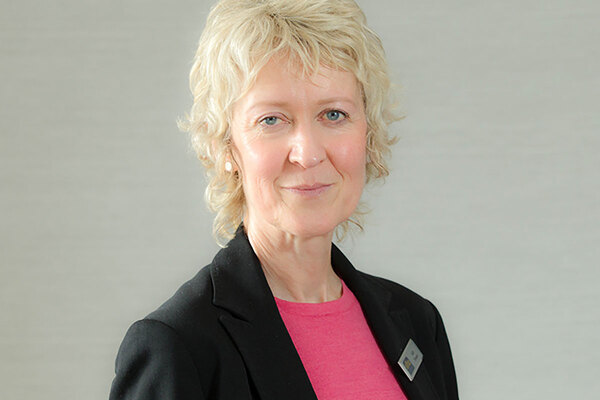15 minutes with… Sheron Carter
Sheron Carter, chief executive of Hexagon, talks to Grainne Cuffe about the cost of living crisis and decarbonisation
You recently joined Hexagon as chief executive. How are you finding the job so far?
I felt settled almost immediately. There’s a real warmth. It’s a nice family atmosphere.
We have a great team. I’m really enjoying working with the board as well. They are very positive.
I’m also working with a really interesting chair, Simon Fanshawe. He’s a strong champion of equality and one of the founding members of Stonewall, the LGBTQ+ campaign group. He’s a really bright, intelligent guy, and he gives you that intellectual challenge around how you lead an organisation, the people agenda and the equalities agenda.
What are your plans for Hexagon?
What will certainly stay the same is the mission of the organisation. We focus on south London, working with local communities, and that’s going to stay the same.
There is a very direct, dynamic and engaged resident engagement structure. [The residents] were involved in the recruitment process for me, for example, and that’s something that we really want to continue.
We want to keep our commitment to equality and diversity.
Hexagon is a great organisation, but we are a bit old-fashioned. I want to sharpen us up a bit in terms of modernisation, so that we have more automation, and we make it easier for staff to do their jobs and for our residents to engage with us.
Another thing that’s really important for me is learning and talent development. We’ve had some recruitment rounds and we’re not always drawing the level of talent that we would want. I’m hearing that this is a sector-wide issue.
If we want to move the organisation forward, if we want to be dynamic, to grow, to be modern, we need to have the talent that can help us to push those agendas.
How is Hexagon approaching the cost of living crisis with its tenants? What support will it have in place?
It’s absolutely a top priority. And it’s complicated, because the cost of living is affecting all of us.
We’re seeing huge increases in development and maintenance costs, and the price of fuel.
It’s getting more challenging to run a business, because of cost inflation.
The question that’s going to be coming up for all of us in the sector in the next few months is, ‘What does that mean for the level of rent-setting and our ability to maintain good services for customers and decarbonisation?’
So there is a balance that we’re going to [have to strike] in the coming years.
We have a tenant welfare fund and we’ve increased that fivefold compared with the level that we had in our budget last year, to £100,000. We’ve done that in anticipation of more customers facing hardship with paying for food or [their] energy bills.
We have teams that work with tenants to maximise their income to make sure that they’re getting any additional Discretionary Housing Payments, or make referrals to food banks for people who are really pressed in terms of
food shortages.
Energy bills are skyrocketing at the moment. What is Hexagon’s approach?
One of the things we’ve started to do when we have a void and there are prepayment meters [in the property] is remove them, because we know that is the most costly form of paying for your energy supply.
We have encouraged people to try to negotiate better terms with their suppliers. And we also encourage them to get in touch with their suppliers, because some have their own financial hardship funds that people can access.
What are your decarbonisation plans?
We did a study last year, so we got to understand our properties a bit more. From that, we know that we have fewer than 1,000 homes that [currently have] an Energy Performance Certificate (EPC) [that is better than] Band C.
One of our first priorities will be to bring those properties up to at least a minimum of Band C. We have set aside £4.2m to do this. That is in addition to our budget, to ensure that we do hit the EPC Band C minimum by 2030.
We’ve set aside over £45m to achieve net zero carbon by 2050. We are aware that Hexagon has a lot of older street properties. We’ve got some beautiful Edwardian and Victorian buildings that are highly desirable, but not necessarily the easiest to make completely carbon neutral.
We would have to take a practical approach to minimise carbon as far as is [possible] within those older properties.
We’re not in the business of disposing of things because they are in the ‘too difficult to do’ box.
Have you got any plans to merge with a larger organisation?
You can never completely take mergers off the table, but we have no active plans to merge.
I don’t know whether mergers provide the solutions they once did. What I’m seeing in the sector is that all providers, including the largest, which could take on another association, are facing these big costs. [They all] have very large commitments in terms of fire safety, building safety and decarbonisation.
So there isn’t an obvious reason at the moment why we would want to merge, but that may change.
‘15 minutes with…’ series
In our ‘15 minutes with…’ series, we have a quick chat with the biggest names in the sector about the most important issues.
Previously, we have featured:
Mushtaq Khan, chief executive of the Housing Diversity Network
Barbara Brownlee, chief executive of Soho Housing
Eddie Hughes, former minister for rough sleeping and housing
Geeta Nanda, chief executive of Metropolitan Thames Valley Housing
David Bogle, chair of Homes for Cathy
Laurence Carr, money coach at Yorkshire Housing
Dinah Roake, chair of the London Housing Panel
Sheron Carter, chief executive at Hexagon
Helen Spencer, executive director of growth at Great Places
Julie Wittich, executive director of assets and sustainability at Accent
Ian Mulheirn, executive director of policy at the Tony Blair Institute for Global Change
Kevin Ruth, chief executive of Together Housing
Piers Williamson, chief executive of The Housing Finance Corporation
Seyi Obakin, chief executive at Centrepoint
Fayann Simpson, senior independent director at L&Q
Mark Perry, chief executive at Vivid
Rose Bean, executive director of assets and sustainability at Abri
Ruth Cooke, chief executive at GreenSquareAccord
Ben Denton, managing director at L&G Affordable Homes
Simon Dudley, chair at Ebbsfleet Development Corporation
Emma Palmer, chief executive at Eastlight Community Homes
Tracy Harrison, chief executive at Northern Housing Consortium












